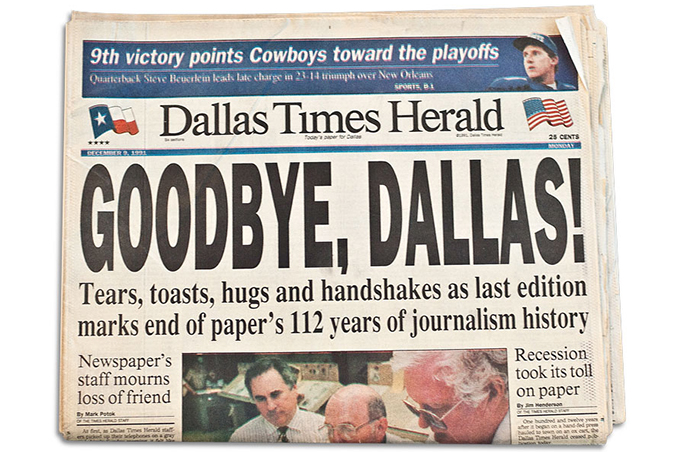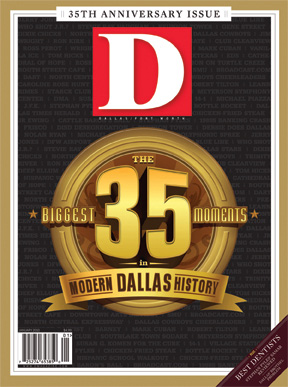Founded in 1888, the Dallas Times Herald was the blue-collar paper that published screaming tabloid headlines in the afternoon. On its staff at one time or another were Skip Bayless, Lee Cullum, Molly Ivins, Blackie Sherrod, Jim Lehrer, and Jim Schutze. On December 8, 1991, Belo, the owner of the Dallas Morning News, bought the paper, which published its last edition the following day.
The decision to close was made by the owners of the Times Herald. They decided that they were going to close down. Then we decided that we would purchase the assets. The sequence is important because I have read from time to time that we bought it and shut it down. That actually is not the way it happened. They shut it down. We then bought the assets.
For me, we certainly fought with the Times Herald—no question about that—and we competed extremely vigorously for a long time. On the other hand, I don’t think anybody envisioned until near the end that one of us would go away, would simply cease to exist.
I don’t know quite how to describe it because while all of that was happening, we were too busy getting our newspaper out, trying to prepare for what might happen, what we learned very near the end was going to happen. And so my principal concern was trying to figure out if they go away and if we get the assets—which we knew by the end of the process that we would—how much of what Times Herald customers valued most highly could we preserve: which features, down to puzzles and all of that. At the same time, how many of those jobs can we preserve? How many people can we afford to hire? How many of their folks would want to be part of theMorning News? How many of their folks would fit in our culture and would be happy there and could contribute there, and how many could we afford to take? And how would we serve the circulation that they had that was exclusive to them at the time? How could we serve the advertisers that they had, which we didn’t have?
So most of the effort that most of my colleagues and I spent during that period was trying to figure out how to preserve what we could of what was good about the Herald. It was a very busy time. It was only after the fact when we realized: they’re not here today.
You’re always better if you have a strong competitor, and I felt that the fact that we were constantly challenged by a competitor made us better and made them better. It was a better result for the readers and the advertisers of both papers.
Then we had to regroup and figure out that the new competition has to be redefined perhaps as “How good can we be? How well can we serve. How well can you do things?” And that’s a different model.
The Dallas Morning News and the Times Herald competed in an extremely robust way for many years, but always with a respect, if not warm friendship, for the other side. The day the Times Herald closed, I recall driving to work, looking at the news racks on about every corner, and feeling a sad emptiness in my day. Most everyone at the Morning News felt the same way. There was no inclination to gloat or to high-five, but an immediate sense that our newspaper had a greater obligation than before to serve everyone in the community.
Burl Osborne, the former publisher of the Dallas Morning News, is interim CEO of California-based Freedom Communications.






